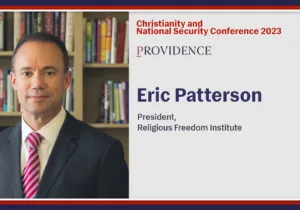This article about how Christians should view an American “empire” first appeared in the Winter 2017 issue of Providence‘s print edition. To read the original in a PDF format, click here. To receive complete future issues as soon as they are printed, subscribe here for only $28 a year.
Preoccupation with “empire” by some American Christian elites may be back. In the 2000s many commentators in Christian Left and Neo-Anabaptist circles obsessed over the threat of American empire. Their fears were stoked by the U.S.-led invasions of Iraq and Afghanistan, and compounded by the now-quaint talk of “theocracy” after Evangelicals supported George W. Bush’s 2004 reelection.
During the Obama years, Christian fears of empire subsided a bit, partly in reaction to limited U.S. strategic withdrawal and the cooling of presidential rhetoric about U.S. global responsibilities. Now that Donald Trump is president, the empire conversation is reigniting.
In terms of America’s global reach, Trump’s sometimes neo-isolationist campaign rhetoric, critical of Bush’s wars and skeptical of the global liberal order sustained by American alliances like NATO, should have pleased Christian critics of empire. Trump’s national security appointments, however, seem more conventionally supportive of longtime American international commitments. Proposed increased military spending implies that the U.S. role in the world will not significantly recede.
Christian critique of empire does not focus exclusively on America’s military and economic footprint. Because empire is seen as incompatible with faith in Jesus Christ, critics reject any collaboration with the global capitalist order, which is sometimes compared with ancient empires that tormented God’s people in the Bible. In the Old Testament, it was Hebrew suffering under Egypt and Babylon. In the New Testament, Christians and Jews were oppressed by Rome, which crucified Jesus.
Much of the anti-empire preoccupation originated in the teachings of the late Mennonite theologian John Howard Yoder, author of The Politics of Jesus who was popularized by Stanley Hauerwas of Duke University’s Divinity School. They insist that Christian faithfulness demands rejection of all violence, including by the state through law enforcement and the military. Hauerwas demonizes America for offering, unlike any other nation, a universal meta-narrative asserting human rights and democracy for all. This vision supposedly conflicts with Christian calls for surrender and self-denial.
Activist Shane Claiborne, whose 2004 book Jesus for President equated America with the Third Reich, relies on the Yoder-Hauerwas schematic. So too do popular pastors/writers Greg Boyd and Brian Zahnd, the latter of whom compulsively tweets against “empire.” There is also Old Testament scholar Walter Brueggemann, who relies more strictly on old-style liberal Protestant allegorizing of the Scriptures to achieve his social justice denunciation of empire.
These Christian critics of empire are not consistent. They typically want America and the West to accept all immigrants and refugees, to regulate the global environment, to sustain larger welfare states, and coercively to impose a Western-inspired egalitarian economic, social, and sexual ethos on the world. They demand their own form of “empire,” reputedly based on the Sermon on the Mount.
While Christian critics of empire don’t want militaries, capitalist economies, robust nation states, or any acknowledgement of the universal pursuit of self-interest manifest in human fallenness, they live in the upper echelons of the “empire.” They benefit from it and indeed would not exist without it, yet seem mostly unaware of the paradox.
The Christian commentariat against empire, from privileged perches at large churches and universities, is free to tweet, chatter, and gather large followings of mostly suburban middle class evangelicals and Protestants thanks to the safety and wealth of the American “empire.” Their lofty social vision of poverty alleviation, universal healthcare, equality for women, and a clean environment would be impossible without the “empire” of powerful regimes sustained by the wealth engines of capitalism and protected by lethal militaries on guard against terror, aggression, and domination.
Among its other omissions, the contemporary Christian critique of “empire” forgets that unlike ancient Egypt, Babylon, and Rome, the current American-led global order has been profoundly shaped by Christian teaching, however haphazardly. The ancient empires may have achieved order, which is not morally insignificant. But the current global order provides stability while also advocating education, disease eradication, increased standard of living for all, democracy, and human rights, including religious freedom, which ought to interest all who claim the name of Christ and wish to extol their love of Him.
It’s noteworthy that critics of “empire,” which they portray as the enemy and oppressor of Christ’s faithful followers, typically evince little to no interest in genuinely persecuted Christians around the world. Casualties of U.S. drone strikes provoke far more sympathy and interest than Christians killed or imprisoned by Islamist regimes or mobs or by communist tyrannies like North Korea.
Suffering Christians in the Middle East, Pakistan, Sudan, China, Vietnam, or countless other oppressive societies likely wish they could live under the protection of “empire.” Ideally, their plight would at least be somewhat alleviated if America and the West advocated harder on their behalf, citing religious freedom as an intrinsic human right guaranteed by the United Nations Charter on Human Rights.
Sadly, critics of “empire” often think Christian-inspired Western notions of human rights and religious liberty are just another tentacle of empire. They root the supposed corruption of Christianity in Emperor Constantine’s embrace of the church, which began the end of Rome’s persecution of Christians. That Constantine’s conversion led to an approximate religious liberty and began the centuries-long Christian-inspired quest for a more just social order does not terribly interest the anti-empire Christian school of thought.
In the wake of Constantine and living in the distress of the Roman Empire’s weakness, St. Augustine of Hippo wrote of God’s providential superintendency of political kingdoms, their rise and fall. But critics of empire are reluctant to admit God’s hand in the temporal order. At best, for them regimes are grudgingly tolerated by the Almighty as a judgement on and foil for the church. Augustine might respond that these critics underestimate the Lord and the wideness of His power and goodness.
American Christians, as agents of “empire,” have been graced by our Lord with a special responsibility for power and influence, which can be used for good or ill, prudentially deployed or cavalierly disregarded. We can advocate a global statecraft that pursues stability, liberty, law, and prosperity. Or we can, as critics of empire seem to demand, self-indulgently and parasitically denounce our blessings while evading responsibility. Surely both godly duty and wisdom summon us to the former.
—
Mark Tooley is president of the Institute on Religion & Democracy and co-publisher and editor of Providence.
Photo Credit: U.S. Army Reserve Soldiers, with the 316th Sustainment Command (Expeditionary), an Army Reserve unit based out of Coraopolis, Pa., and 451st ESC, an Army Reserve unit based out of Wichita, Kan., raise an American flag during an American flag honoring event at the Area Support Group – Kuwait headquarters at Camp Arifjan, Kuwait, Dec. 29, 2016. (U.S. Army Photo by Staff Sgt. Dalton Smith)







 Live in the DC area? Sign-up for Providence's in-person events list!
Live in the DC area? Sign-up for Providence's in-person events list!